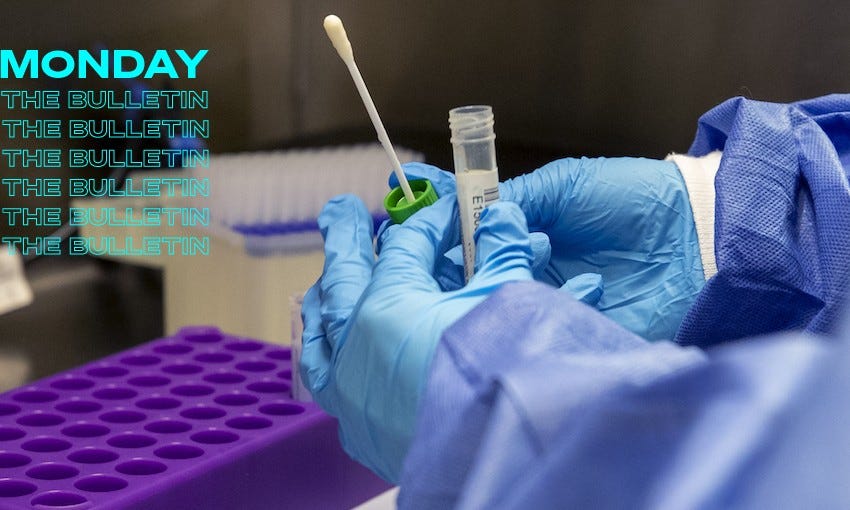Global travel restrictions as Omicron variant emerges
Little is yet known about the new variant, but experts warn that New Zealand’s reopening plans might need to be put on hold
Mōrena and welcome to The Bulletin for Monday, November 29, by Justin Giovannetti. Presented in partnership with Z Energy.
In today’s edition: Luxon ahead for National leadership; traffic light announcement today; the country’s mega landlords; but first, the sudden appearance of Omicron.
Covid-19 tests being prepared for analysis (Peter Byrne/PA Images via Getty Images)
The world reacts to Omicron with mass travel bans. Countries around the world, including New Zealand, rushed to contain the new Omicron variant of the Covid-19 virus over the weekend. On Saturday alone, the variant was detected in the UK, Germany, Italy and the Czech Republic. Yesterday, Australia’s first two cases of the variant were detected in New South Wales. Previously known as B.1.1.529, Omicron was given a name and listed by the World Health Organisation as a variant of concern on Friday. It’s the first variant given that designation since delta in May. As The Observer reports, Omicron has developed incredibly quickly, emerging in South Africa only two weeks ago. It rapidly displaced delta to become the country’s most dominant variant.
What do we know about Omicron? A new Covid-19 variant was always going to emerge and most experts say that it’s important to keep a level head and not jump to catastrophe. According to Reuters, scientists are worried about the variant, but don’t have many answers for what it’ll mean. While Omicron has over 30 mutations on its spike protein (the part of the virus that allows it to enter our cells) it isn’t clear if that’ll have a significant impact on existing vaccinations. While it’s believed to be more infectious than delta, researchers and pharmaceutical firms are rushing to find out more. Scientists in Botswana and South Africa, along with health authorities, are being thanked for immediately warning the international community of their discovery. As Stuff reports, a South African doctor has said that Omicron symptoms in patients are unusual but seem mild.
What New Zealand has done so far. On Saturday night, the government designated nine countries as being very high risk to New Zealand. Those countries are South Africa, Namibia, Zimbabwe, Botswana, Lesotho, Eswatini, Seychelles, Malawi and Mozambique. On the advice of director-general of health Ashely Bloomfield, only New Zealand citizens will be allowed to return from those countries. Any returnees, including those in transit when the rule took effect yesterday, will need to stay in managed isolation for a full 14 days, rather than the shorter seven day stays for arrivals in recent weeks. “Our understanding of the Omicron variant is still very much in its infancy and we’re confident this variant hasn’t entered New Zealand,” said Covid-19 minister Chris Hipkins in a statement.
While it’s still early, this could have an impact on New Zealand’s reopening strategy. It was only on Wednesday that Hipkins unveiled a plan to begin phasing-out managed isolation from January. That would follow the country moving away from the alert level system and elimination, in favour of the traffic light system later this week. Last Thursday, Hipkins said that the country would revert back to the alert levels if a vaccine-resistant variant arrived here. As Newshub reports, experts now say the government should wait before reopening the borders. Epidemiologist Michael Baker warned that if the new variant is a threat to the effectiveness of vaccines, “then we would need to rethink our strategy in quite a big way, but we have time.”
If you like what you’re reading, we need your support. The Spinoff is doing our utmost to keep you updated on Covid-19 related news. Every dollar our members contribute directly funds our editorial team and is devoted to ensuring we do more. Click here to learn how you can support the team today.
Chris Luxon could have the edge in National leadership contest. The NZ Herald reports that the first-term MP is in the race and could have the numbers after a weekend where former prime minister John Key supported him in conversations with MPs. According to Politik (paywalled), former leader Judith Collins has also thrown her support behind Luxon and has a small group of MPs ready to vote for him. Simon Bridges is a few votes behind, but much could change before the leadership is decided tomorrow afternoon.
The Covid numbers: There are 82 cases in hospital and 9 in ICU/HDU. A total of 8,118 cases have been detected in the delta outbreak. 127 new community cases were reported in Auckland yesterday, 9 in Waikato, 4 in Bay of Plenty, 2 in Northland and 1 in Hawke’s Bay. 20,873 people were vaccinated on Saturday.
The Spinoff’s Covid data tracker has the latest figures.
Queenstown readying Covid plan for expected infections. While much of the attention has been focused on Auckland, cities throughout the motu are preparing for Covid-19 cases to follow the introduction of the traffic light system. That includes the South Island, where most locals haven’t had much reason to think about the virus since the start of the pandemic. As the Otago Daily Times reports, Queenstown is readying a plan for its doctors and clinics to keep cases self-isolated and cared for.
The prime minister will announce at 4pm today which regions will go into the red and orange settings of the new traffic light system. RNZ has an explainer on what we can expect this afternoon and which questions still haven’t been answered, like what constitutes a “region”. We should all be in the new system from Friday.
Wellington teen wins national spelling bee. After other students fell to the words Portuguese, embryonic and corsair, Max Carter won after two hours of correct spelling. The Dominion post reports that a number of contestants were in Auckland and had to appear virtually at the Wellington event. What’s the correct spelling of Carter’s winning word (answer at the bottom):
a) Gossemer
b) Gossimer
c) Gossamer
New Zealand’s mega landlords: The small group who own many of the country’s houses. The belief that most of the country’s rental properties are owned by mum and dad investors is a myth, according to a new series from Stuff. The investigation looks at a small class of investors who each own over 20 houses and found that over time, more and more of the country’s housing stock is being concentrated in fewer and fewer hands. In total, a small group at the top collectively owns 22,100 rentals. As the housing market has become more concentrated, the only group that has seen its share fall is first-home buyers.
A correction. In the Friday edition of this newsletter I wrote Kate Hawkesby’s name on a list of people moving to Today FM. She is staying at Newstalk ZB. Instead, Rachel Smalley will front a new 5am show going up against Hawkesby. I apologise for the error.
Got some feedback about The Bulletin, or anything in the news?
Get in touch with me at thebulletin@thespinoff.co.nz
Right now on The Spinoff: Naomii Seah lists how the possible candidates for National leader have voted on big ethical issues. Siouxsie Wiles & Toby Morris look at the very serious threat of antimicrobial resistance and why you should care. Justin Latif reports on the South Auckland clinic, owned by Destiny Church members, that’s vaccinating thousands. Chamanthie Sinhalage-Fonseka writes about growing up Kiwi-Asian in the early 2000s. Claire Mabey’s essay was judged second best in the annual Landfall competition and is published on The Spinoff for the first time.
For a longer read today, how the pandemic has distracted us from politics. Writing in the Listener (paywalled), Bill Ralston predicts there will be a mighty row after the pandemic passes—that’s a happy thought. With a massive overhaul of the health care system, Three Waters and the housing intensification bill moving through parliament, the country’s institutions are undergoing a massive series of changes as attention is focused on Covid-19, he writes.
Black Caps will need a big, historic effort to win. The team faces a tough final day in Kanpur, RNZ reports. The word “heroic” has also been used to describe what’s needed from the Black Caps. Some questionable officiating and a review that was called moments too late added to yesterday’s drama.
The correct answer is c.
That's it for The Bulletin. If you want to support the work we do at The Spinoff, please check out our membership programme.







